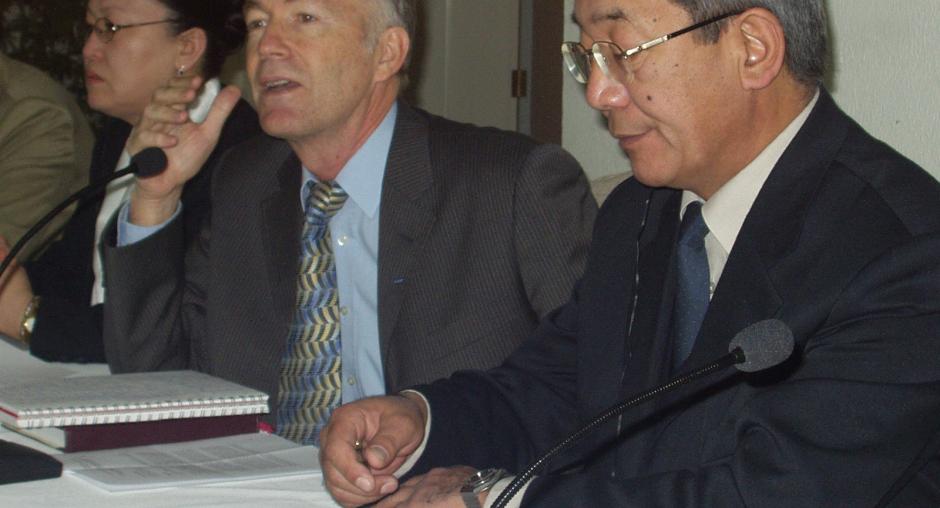Newsroom
Criminal justice reform moves up the political agenda in Kyrgyzstan with OSCE conference
BISHKEK 25 January 2004

(OSCE)Minister of Justice Kurmanbek Osmonov (right), Head of the OSCE Centre in Bishkek Markus Mueller (centre), and Baekova Cholpon, Chairwoman of the Kyrgyz Constitutional Court, at a conference on reforming the criminal justice system, 24 January 2004. (OSCE) Photo details
BISHKEK, 25 January 2004 - The reform of Kyrgyzstan's criminal justice system topped the agenda of a three-day international conference in the country's capital which concluded today, organized by the OSCE's Office for Democratic Institutions and Human Rights (ODIHR) and the OSCE Centre in Bishkek.
"Keeping people in prison is an expensive 'pleasure' for any state and does not make criminals any better", said Kurmanbek Osmonov, the Minister of Justice and First Deputy Prime Minister of the Kyrgyz Republic in some candid and critical opening remarks.
Noting that the "isolation of a person in prison should only be an exclusive and last measure", Mr.Osmonov suggested the introduction of alternative sanctions and a fundamental correction of the legal policy of the Kyrgyz state.
Ambassador Markus Mueller, the Head of the OSCE Centre, agreed that modern legal systems had to find a balance "between sanctions and rehabilitation". The conference was designed to help Kyrgyzstan to overcome the heritage of the Soviet system, he added. He also highlighted the importance of the legal and political community taking an active role in the reform process, and noted that changes must be honoured in practice, in order to achieve the intended results.
Ms. Cholpon Baekova, Chairwoman of the Kyrgyz Constitutional Court, said it would be difficult to give up the practices and methods of the past, however, she described the Conference as a "breathtaking" exchange of new approaches to the administration of justice.
The three-day event, 'Criminal justice reform: problems, priorities, and perspectives for the Kyrgyz Republic', brought together experts and officials from Kyrgyzstan, Russia, the United States, Germany and Kazakhstan to share experience and discuss ways to ensure compliance with international human rights standards of criminal justice.
Participants emphasized the need for comprehensive legislative reform, including the Criminal and Criminal Procedure Codes of the Kyrgyz Republic. The OSCE/ODIHR will complete an assessment of these codes in spring 2004.
Other partners in the event were the Presidential Administration and the Ministry of Justice of the Kyrgyz Republic; as well as the United States Department of Justice Office for Prosecutorial Development, Assistance and Training. It was funded by the governments of the Netherlands and the United States.
"Keeping people in prison is an expensive 'pleasure' for any state and does not make criminals any better", said Kurmanbek Osmonov, the Minister of Justice and First Deputy Prime Minister of the Kyrgyz Republic in some candid and critical opening remarks.
Noting that the "isolation of a person in prison should only be an exclusive and last measure", Mr.Osmonov suggested the introduction of alternative sanctions and a fundamental correction of the legal policy of the Kyrgyz state.
Ambassador Markus Mueller, the Head of the OSCE Centre, agreed that modern legal systems had to find a balance "between sanctions and rehabilitation". The conference was designed to help Kyrgyzstan to overcome the heritage of the Soviet system, he added. He also highlighted the importance of the legal and political community taking an active role in the reform process, and noted that changes must be honoured in practice, in order to achieve the intended results.
Ms. Cholpon Baekova, Chairwoman of the Kyrgyz Constitutional Court, said it would be difficult to give up the practices and methods of the past, however, she described the Conference as a "breathtaking" exchange of new approaches to the administration of justice.
The three-day event, 'Criminal justice reform: problems, priorities, and perspectives for the Kyrgyz Republic', brought together experts and officials from Kyrgyzstan, Russia, the United States, Germany and Kazakhstan to share experience and discuss ways to ensure compliance with international human rights standards of criminal justice.
Participants emphasized the need for comprehensive legislative reform, including the Criminal and Criminal Procedure Codes of the Kyrgyz Republic. The OSCE/ODIHR will complete an assessment of these codes in spring 2004.
Other partners in the event were the Presidential Administration and the Ministry of Justice of the Kyrgyz Republic; as well as the United States Department of Justice Office for Prosecutorial Development, Assistance and Training. It was funded by the governments of the Netherlands and the United States.
